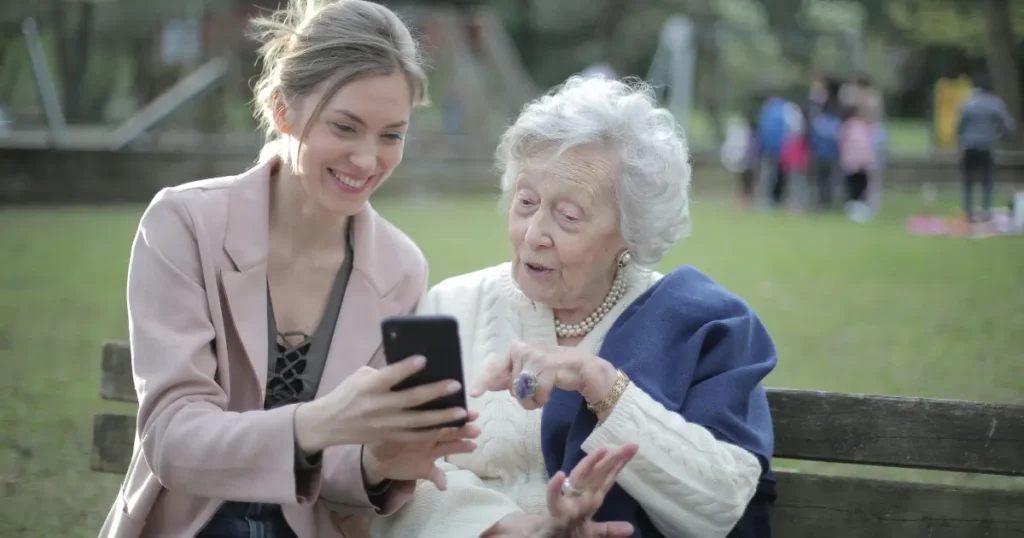Our relationships with our parents as adult children are among the most profound in this complex world. This journey is filled with challenging moments, joyful times, and an unbreakable bond. As time passes, many of us find ourselves caring for our aging parents. This responsibility brings with it tasks and priceless opportunities for emotional connection. That’s why we discuss 10 ways to help your parents in this post.
Imagine sitting with your elderly parent and talking about happy memories when suddenly you understand how important these times were. It is the connection between an adult child and a parent; it is all about caring for the people who used to care for us. As more adult children take on caregiving roles, people become more aware of how important family ties are at all stages of life.
It’s important to bring love and care back into these important connections. To do this, we’ll look at 10 ways to help your parents, offer emotional support, and improve the bond between a parent and child. These ways meet practical needs and help build the deep connection between people at the heart of family love and friendship.
Let’s go on this journey together, looking for meaningful ways to care for and treasure our relationships with our parents as they age. If we understand, empathize, and take action, we may rediscover the beauty of caregiving and create lifelong memories filled with love, generosity, and steadfast support.
10 Ways to Help Your Parents: Quality Time with Parents

Importance of Spending Quality Time with Aging Parents
It’s easy to forget what’s important in this busy world: the special times spent with family and friends, especially parents who are getting older. We can’t say enough good things about spending quality time with our parents. These times make memories that last a lifetime, build bonds, and feed the soul.
Our parents’ needs change as they get older, and they often value being with us. Quality time doesn’t have to be fancy or planned out. It can be as simple as having a cup of tea, taking a stroll in the park, or having an honest chat.
These times of connecting aren’t just about the things we do; they’re also about giving each other our full attention, love, and presence. They let our parents know we care about them, make them happy, and tell them they are loved and appreciated.
Also, spending valuable time with our aging parents is good for us in many ways. It makes people feel less lonely and alone, improves their mental and emotional health, and gives them a sense of safety and connection.
It’s a simple fact that every minute we spend with our elderly parents builds love, kindness, and family ties that get stronger over time. So, let’s make time for the essential things in life—making memories that will last a lifetime and taking care of the relationships that make our lives pleasant and meaningful.
Read More: How to Handle Elderly Parents Making Poor Decisions
10 ways to help your parents: Activities to Do Together
Making memories that will last a lifetime by planning meaningful activities with your aging parents will enhance your relationship with them and bring you closer together. Here are 10 ways to help your parents and spend quality time with them:
1. Cooking Together: Share family recipes or try new ones. Cooking can be relaxing and bring people together.
2. Gardening: Take care of plants or make a small yard with your partner. It’s a calm exercise that helps you connect with nature and relax.
3. Arts and crafts: To be more creative, try drawing, crafting, or doing do-it-yourself projects. Let your imagination run wild, and enjoy making something lovely with your partner.
4. Reading or Storytelling: Share your favorite books, read aloud, or plan storytelling sessions. These activities allow you to talk about important things and spark your mind.
5. Music and Dance: Sing with your favorite songs or have a dance party. Music has a magical effect on making people happy and uplifted.
6. Outdoor Adventures: Go for walks, go to parks, or plan a lunch outside. The bonding experience is better when there is fresh air and beautiful scenery.
7. Memory Lane: Look through old picture albums, watch videos of your family, or think about things that happened in the past. Sharing memories makes emotional ties stronger and helps people understand each other better.
8. Volunteering Together: Participate in community service or volunteer activities. Helping each other builds values of kindness and empathy.
9. Fitness Activities: Do yoga, light workouts, or other gentle activities for people of all fitness levels while working together. It’s good for your health and helps people connect.
10. Technology Time: Play online games, video call family members who live far away, or explore digital hobbies with your family.
Each of these things gives you a different chance to spend time together, have fun, and show your love and appreciation for each other.
Read More: 5 Ways to Improve the Quality of Your Relationship With Others
Benefits of Bonding Through Shared Experiences
The bond that forms through shared situations is very good for both parents, who are getting older, and adult children. Here’s why doing worthwhile things together is so important:
1. Emotional Connection: When people share experiences, they form stronger emotional connections that make them feel closer and more understood.
2. Memory Formation: Meaningful activities foster long-term memories that offer joy and nostalgia, strengthening the fabric of family history.
3. Stress Reduction: Spending quality time together decreases stress, improves relaxation, and boosts mood.
4. Communication: Doing things together makes it easier to have deep talks, improving communication and understanding.
5. Sense of Purpose: Sharing experiences makes you feel like you belong and gives you a sense of purpose, which is good for your general health.
6. Health Benefits: Spending quality time together and doing things together suits families’ mental, emotional, and physical health.
Bonding through shared experiences is a priceless gift that strengthens relationships, creates cherished memories, and fills lives with love, laughter, and meaningful connections.
Read More: How to Fix a Toxic Relationship With Your Partner: Heal and Thrive
Acts of Service for Parents: Speaking the Love Language of Action

Ways to Show Love and Care Through Acts of Service
Service is a solid way to show love and care, especially for parents who are getting older. Here are 10 ways to help your parents or sincere ways to show love through acts of service that matter:
1. Home Maintenance: Do jobs around the house, such as cleaning, laundry, and gardening, to make their lives easier and the place more comfortable.
2. Meal Preparation: Cook nutritious meals, stock their cupboard with basics, or arrange meal deliveries to ensure they have healthy and handy options.
3. Managing Medications: Help them stay on track with their healthcare plan by reminding them to take their medicines, get refills, and keep their pillboxes in order.
4. Help with Transportation: To make things easier and show support, offer rides to meetings, the store, or social events.
5. Help with Technology: Help them set up and fix their devices and show them how to use digital tools for fun or conversation.
6. Financial Guidance: To reduce stress and ensure financial security, give advice on budgeting, paying bills, and making financial plans.
7. Healthcare Advocacy: Go with them to the doctor’s visit, write down notes, ask questions, and speak up for their healthcare needs.
8. Home Safety: Check your home for safety risks and make changes, such as adding grab bars, ramps, or other features that make it safer and easier to move around.
9. Emotional Support: Listen with kindness, offer support, and reassure them when things are hard.
10. Organizational Assistance: getting rid of clutter, organizing papers, or doing paperwork to make things more organized and give you peace of mind.
Each act of service shows your love and loyalty, and we thank you for all your parents have done for you. You must go the extra mile to ensure their health, happiness, and safety.
Using 10 ways to help your parents as a sign of love and care, you make their lives easier and strengthen the love and support that make family ties what they are. These acts of selflessness and kindness leave a loving memory that lasts generations and feeds the heart and soul.
Read More: Unlock 10 Tips on Maintaining Good Social Relationship with Others
Practical Examples of Helpful Gestures for Aging Parents
10 ways to help your parents and real-life examples of acts of kindness that may make a big difference in the lives of elderly parents:
1. Errand Assistance: Offer to conduct errands on their behalf, such as grocery shopping, prescription pickup, or banking transactions.
2. Home Safety Checks: Ensure the safety of their living space by regularly checking it for possible dangers and adding safety features like handrails or grab bars.
3. Technology Support: Help them set up and use their tech devices, fix problems, and show them how to use digital tools for fun and conversation.
4. Meal Preparation: Prepare nutritious meals, freeze portions for later use, and keep healthy snacks available throughout the day.
5. Appointment Accompaniment: Go with them to the doctor’s office, take notes, ask questions, and be there for them emotionally during the trips.
6. Household Organization: Help eliminate clutter, organize things, name things so they are easy to find, and make the living space more functional.
7. Financial Management: Help them make a budget, pay their bills, and plan their finances to be financially stable and safe.
8. Check-ins daily: Call, video chat, or visit them often to see how they’re doing, discuss your worries, and offer the company.
9. Transportation Assistance: Provide rides to social events, recreational activities, or appointments to help individuals stay connected with their community.
10. Personal Care Help: If needed, help with chores like grooming, dressing, and remembering to take medications.
These 10 ways to help your parents or helpful actions show that you love and care about them and are dedicated to their health and happiness. They also make their daily lives more accessible and more fun.
Read More: When Someone Is Always Angry: How to Respond
How Small Acts Can Make a Big Difference in Their Daily Lives
Small acts of kindness that are well-thought-out can have a big effect on the daily lives of older parents. Even though these things may seem unimportant or regular, they have a huge impact on their quality of life:
1. A sense of security: Making simple safety checks and changes to their homes can give them peace of mind and make them feel safer.
2. Physical Comfort: Eating healthy meals and getting help with personal care and home maintenance improves their health and comfort.
3. Emotional Health: Regular check-ins, company, and hearing with empathy help them feel connected emotionally and improve their mental health.
4. Independence: You give them the power to stay independent and self-reliant by helping them with things they might find hard, like using technology or getting around.
5. Quality Time: Doing things together, eating meals together, or just being together strengthens relationships and makes memories that will last a lifetime.
6. Peace of Mind: Knowing they have your love, support, and help gives them peace of mind, especially when things are hard.
Small acts of kindness and beneficial actions like these make a big difference in the daily lives of aging parents, improving their health, happiness, and general quality of life.
Communication with Parents: The Power of Words

Importance of Open and Honest Communication with Elderly Parents
Communication that is open and honest is key to making relationships work, especially with parents who are getting older. This is why it’s important:
1. Understanding: Being honest with each other lets them share their feelings, thoughts, and problems without worrying about being judged.
2. Trust: Being honest with each other makes things clear and builds trust, making it safe for deep talks and emotional support.
3. Connection: Good communication strengthens the emotional bond and creates a feeling of closeness and belonging.
4. Solving Problems: Open communication allows us to solve problems, deal with issues before they get out of hand, and find solutions that work for everyone.
5. Validation: Listening and speaking about oneself honestly helps support and understand each other’s experiences, feelings, and points of view.
Basically, learning 10 ways to help your parents and being open and honest with them when you talk to them sets the stage for deep bonds and peaceful relationships.
Read More: How to Change Your Mindset Overnight: Transform Your Love Life
Tips for Effective Communication Strategies
Here are some valuable tips for clearly talking to your old parents:
1. Active Listening: To grasp someone’s point of view completely, give them your full attention, maintain eye contact, and demonstrate empathy.
2. Clarification: Clear up any confusion, ask questions to clarify things, and rephrase what they said to make sure everyone understands.
3. Respect Boundaries: Don’t cross their lines, don’t talk over them, and let them talk at their own pace.
4. Use of Empathy: Show empathy by recognizing and confirming their feelings and supporting and understanding them.
5. Positive Reinforcement: To reinforce good communication patterns, give positive comments, praise efforts, and show appreciation.
6. Patience and Understanding: When you’re having a tough or sensitive talk, be patient and understanding, and don’t judge.
These tips and 10 ways to help your parents can improve your relationship with your old parents, help them understand you better, and encourage you to talk to them more often.
How to Navigate Difficult Conversations with Sensitivity and Respect
To have tough talks with your elderly parents, you need to be sensitive, understanding, and respectful. Here’s how to start these kinds of conversations:
1. Choose the Right Time: Choose a calm, private environment and a time when both sides are comfortable and open to discussion.
2. Show Concern: Begin conversations with empathy and genuine concern for their well-being. It will help you frame the topic in a caring and supportive way.
3. Active Listening: Pay close attention, don’t judge, validate their feelings, and respect their point of view to support the space.
4. Use “I” statements: These let you say what you think and feel without blaming anyone else. Instead, they focus on your own feelings and experiences.
5. Work Together to Find Solutions: Help them find solutions, talk about their choices, and make decisions so that you respect and give them power.
6. Respect Their Wishes: Respect their freedom and choices, even if they differ from what you want. Understand and back up their choices.
You can deal with problems and keep your relationship with your elderly parents positive by having tough talks with them using 10 ways to help your parents: empathy, respect, and sensitivity.
Lending a Helping Hand: Assisting Aging Parents

As our parents age, they might need more help with daily chores. Here are 10 ways to help your parents; you can help them while still allowing them to be independent.
Strategies for Providing Physical Assistance to Elderly Parents
Giving your senior parents physical help requires careful planning and kindness. Here are helpful ways to show your support:
1. Mobility Aid: Buy walkers, canes, or bicycles to help them get around and be more independent.
2. Home Modifications: Install grab bars, ramps, or railings to improve safety and accessibility.
3. Get Help with Activities of Daily Living (ADLs): As needed, help with cleaning, dressing, grooming, and going to the bathroom while respecting their individuality and choices.
4. Medication Management: Organize drugs, set up pillboxes, and provide reminders to ensure that prescriptions are taken as prescribed.
5. Nutritional Support: Make sure healthy meals are made, dietary preferences and restrictions are met, and the person stays hydrated and gets enough food.
6. Transportation: To help them stay independent and social, offer to drive them to meetings, social events, or errands.
7. Preventing Falls: To lower the risk of falls, avoid them, like getting rid of things that could cause someone to trip and ensuring that paths are well-lit.
8. Assistive Devices: Help them meet their physical and functional needs by giving them adaptive tools, hearing aids, or magnifiers.
By using 10 ways to help your parents, you can help your aging parents physically in ways that keep them safe, comfortable, and healthy.
Read More: Exploring Child Rages Only at Home: From Love to Fury
Resources and Tools to Aid in Caregiving Responsibilities
Caring for someone can be challenging, but getting resources and tools can make it easier. These are helpful links:
1. Caregiver Support Groups: You can join a local or online caregiver support group to get advice and help and to share your experiences with other people who are going through the same things you are.
2. Home Healthcare Services: Look into professional home healthcare services that offer skilled nursing and help with personal and short-term care for workers.
3. Technology Solutions: Using technology solutions like medical alert systems for remote healthcare management. These apps remind you to take your medications and telehealth services.
4. Community Resources: For your elderly parents, use community resources like senior centers, food delivery services, transportation services, and social events.
5. Legal and Financial Help: Get legal and financial help with planning your estate, finding long-term care choices, and getting the benefits and resources that are out there for older people.
6. Educational Materials: Get access to workshops, online tools, and educational materials on how to care for seniors, plan for their care, and manage their health care.
These resources and tools allow caregivers to successfully carry out their duties and provide the best care for their elderly parents.
Balancing Independence with Necessary Support
To value autonomy and promote well-being, finding a balance between independence and the needed help is important. This balance can be reached in this way:
1. Evaluate Needs: Regularly assess their needs, preferences, and skills to provide support and help that fits their needs.
2. Encourage Independence: Give them the freedom to make their own decisions, let them handle daily tasks independently, and give them the tools they need to stay busy and involved.
3. Give Them Options: Give them options and include them in making decisions about their care, living situation, and lifestyle choices.
4. Respect Their Dignity: When you help them, respect their private and personal space and sense of autonomy and self-worth.
5. Communicate Openly: Maintain open communication, listen to their concerns and preferences, and work together to develop solutions that respect their freedom.
Caregivers can create a safe and supportive space for aging parents that supports their freedom and quality of life by finding a balance between independence and needed support.
The Language of Love: Gift Ideas for Parents

Giving them gifts is a great way to show you care. Their needs and wants may change as they age, though. Here are some ideas for gift-giving that show how much you care and love someone.
Thoughtful Gift Suggestions to Show Appreciation
A sincere 10 ways to help your parents and show them you love and appreciate them is by giving them thoughtful gifts. Here are some gift ideas that mean a lot:
1. Personalized Keepsakes: If you want to give a gift that means a lot to someone, think about personalized keepsakes like jewelry with a name engraved on it, picture albums, or custom-made art.
2. Memory journals: Give them a notebook or scrapbook to write thoughts, memories, and important events. This way, they can keep these special times alive for years.
3. Membership Services: Consider magazine subscriptions, streaming services, and book clubs as membership services that can help you with your hobbies, interests, or favorite activities.
4. Gifts of experiences: To make memories that will last a lifetime, give the gift of experiences like music tickets, theater tickets, museum admission, or a weekend getaway.
5. Relaxation and Wellness: For a relaxing and healthy experience, think about giving gifts like spa vouchers, aromatherapy sets, or massage lessons.
6. Technology Gadgets: Use tablets, e-readers, and digital frames to improve connectivity, enjoyment, and convenience.
7. Gourmet Treats: For foodies, gourmet food boxes, specialty teas or coffees, or a cooking class are all great ways to please their taste buds.
9. Home Comfort: Add comfort to your home with soft blankets, pretty decorations, or smart home gadgets that make life easier and the place look better.
The thoughtful gifts show parents how much they love, care for, and appreciate everything they have done.
Considerations for Choosing Gifts That Align With Their Interests and Needs
When picking out gifts for parents, think about what they like, what they need, and what interests them. Here are some essential things to think about:
1. Personal Preferences: Consider what they like to do for fun and make sure your chosen gifts relate to those interests.
2. Practicality: Pick practical gifts that meet their daily requirements, making things easier to use and more functional.
3. Sentimental Value: Choose gifts that are important to you, bring back fond memories, or represent special times you’ve spent together.
4. Quality Over Quantity: Choose well-made, long-lasting gifts that show attention to detail if you want to give quality over quantity.
5. Health and Well-Being: Think about giving them things that are good for their health, wellness, and relaxation, which will help their mental and physical health.
6. Surprise Element: Choose joyful, exciting, and unexpected gifts that are one-of-a-kind or unexpected to add a surprise element.
By thinking about 10 ways to help your parents, you can pick gifts that fit their needs, hobbies, and preferences, making the moment memorable and vital.
Importance of Meaningful Gifts That Foster Connection and Joy
Meaningful gifts are more than just things; they bring parents and children closer together and make them happier. This is why they’re important:
1. Expression of Love: Meaningful presents demonstrate love, thanks, and appreciation, strengthening the relationship between parents and children.
2. Shared Experiences: Gifts that allow people to share experiences create lasting memories, strengthen bonds, and encourage spending valuable time together.
3. Emotional Impact: Thoughtful Gifts make people feel good, smile, and bring joy and happiness.
4. Sharing Values: Giving gifts that show shared views, values, and interests shows that you understand, care, and want to connect with someone on a deeper level.
5. Strengthening Relationships: Meaningful gifts help people understand each other better and remind us how important family bonds are.
Meaningful gifts are expressions of love, care, and appreciation that help parents connect, have fun, and cherish special times with their children.
A Lasting Connection: Strengthening the Parent-Child Bond

The bond between a parent and child is a valuable gift that lasts a lifetime. It’s even more important to keep this tie strong as we become adults.
Importance of Nurturing the Parent-Child Relationship Over Time
Taking care of the connection between a parent and child over time is a very important deep journey. This is why it’s important:
1. Love as a Foundation: The bond between a parent and child is based on love, trust, and support, all shaping mental health and strength.
2. A Sense of Belonging: Strong family relationships provide a sense of belonging, identity, and security, serving as a haven in life’s hardships.
3. Emotional Connection: Healthy relationships between parents and children involve deep emotional connections, understanding, and respect for each other.
4. Life Lessons: The bond between a parent and child is a source of important lessons, advice, and knowledge passed down from generation to generation.
5. Mutual Support: Strong ties allow parents and children to lean on each other when needed.
By caring for the relationship between a parent and child and understanding 10 ways to help your parents, we leave behind a heritage of love, strength, and lasting bonds that improve our lives and future generations’ lives.
Techniques for Strengthening Bonds Through Shared Memories and Traditions
Sharing memories and customs is a powerful way to strengthen the bond between parent and child. Here are some of 10 ways to help your parents or techniques to think about:
1. Establish Family Rituals: Set traditions such as weekly family dinners, holiday celebrations, or special outings to foster bonding and shared experiences.
2. Share Stories and Memories: Share family stories, anecdotes, and memories to pass down values, heritage, and a sense of belonging to future generations.
3. Document Family History: To preserve and commemorate family history and legacies, create a family tree, collect oral histories, or compile photo albums.
4. Celebrate Milestones: Mark important events, accomplishments, and milestones by celebrating them with others to make memories and strengthen ties.
5. Do Activities That Matter: Do activities related to your shared hobbies, interests, or loves. It will help you connect and enjoy each other’s company.
6. Express Gratitude: Expressing gratitude, appreciation, and affection on a daily basis reinforces love, respect, and emotional connection.
Using the 10 ways to help your parents, we can weave together a web of memories, traditions, and events that parents and children share, strengthening their bond.
How to Overcome Challenges and Conflicts to Build a Stronger Connection
Dealing with problems and disagreements is important to building a better bond between parents and children. Here’s how to handle these situations:
1. Open Communication: Encourage genuine, truthful, and polite talk to deal with problems, share feelings, and discover answers.
2. Empathy and Understanding: To understand and build empathy, help each other see things from the other person’s point of view and listen actively.
3. Forgiveness: Work on forgiving others, letting go of old grudges, and building a good relationship with them.
4. Set limits: Establish clear limits, respect each other’s boundaries, and discuss what you expect from each other to help everyone appreciate and understand each other.
5. Get Help: If needed, seek help from family therapists, counselors, or support groups to deal with problems and strengthen your ties.
Problems can be solved by showing empathy, talking to each other, and wanting to understand each other. It will help parents and kids build a better, more resilient relationship.
A Listening Ear: Supporting Parents Emotionally

Our parents’ emotional needs may change as they age. Here are 10 ways to show your support and ensure your parents feel safe enough to talk about their thoughts.
Ways to Provide Emotional Support to Aging Parents
A heartfelt way to show love and care for aging parents is to offer emotional support. Here are some ways to show mental support:
1. Active Listening: Be there and pay attention, listen without judging, and let them know that your feelings and experiences are understood.
2. Understanding and Empathy: Put yourself in their shoes, feel their feelings, and show that you understand and care about them.
3. Encouragement and Affirmation: Tell them you appreciate their hard work and skills and say positive things about them.
4. Quality Time: They do things they enjoy together for quality time, build a bond, and make memories that will last a lifetime.
5. Show Love and Gratitude: To strengthen emotional bonds, show love, gratitude, and respect through words, actions, and body language regularly.
6. Respect Their Freedom: Allow them to feel in charge and worthy by respecting their freedom, choices, and preferences.
7. Provide Comfort: Hugs, gentle touches, and other encouraging actions can help someone feel better. They can show support and care.
By understanding 10 ways to help your parents and providing them with emotional support, we improve their health, strengthen their relationships, and let them know that we value and love them.
Recognizing and Addressing Feelings of Loneliness or Isolation
The mental health of aging parents needs to recognize and deal with feelings of loneliness or isolation. How to do it:
1. Regular Check-Ins: To stay connected and fight feelings of loneliness, check in with them regularly by calling, visiting, or video chatting.
2. Encourage Social Engagement: To make friends and avoid feeling alone, encourage people to join clubs, social events, or groups.
3. Plan Social Outings: To meet new people and spend time with old ones, plan social outings, get-togethers with family or friends, or neighborhood events.
4. Support Network: Get together a group of friends, neighbors, or caregivers who can be there for you and offer mental support and company.
5. Use of Technology: Show them how to use technology to talk to each other, connect with others, and stay in touch with family members and friends.
6. Professional Support: If you feel lonely or alone, consider professional guidance, therapy, or support groups.
Recognizing 10 ways to help your parents and discussing these feelings can create a supportive space that encourages mental health and connection.
Creating a Supportive Environment for the Open Expression of Emotions
Making a space where people feel safe to talk about their feelings promotes good communication and emotional connection. Here’s how to make that kind of environment:
1. Safe Space: Give them a place where they don’t have to worry about being judged or criticized when they talk about their feelings.
2. Encourage Sharing: Allow people to freely share their thoughts, feelings, and worries and listen with care and understanding.
3. Normalize Emotions: You can normalize emotions by telling people it’s okay to feel a range of feelings and letting them know you understand without judging them.
4. Encourage Communication: Let them say what they need, what they want, and what their limits are, and accept the way and speed at which they talk.
5. Respond with support: Show understanding, agree with them, and show your support. If needed, offer reassurance, encouragement, and real help.
6. Self-Care: To improve your mental health, encourage self-care activities like hobbies, relaxation methods, or activities that focus on the present moment.
By making it safe for people to talk about their feelings, we strengthen emotional ties, improve understanding, and improve the overall health of aging parents.
A Team Effort: Family Caregiving Strategies

Caring for aging parents is often something brothers and other relatives do together. Here are one of 10 ways to help your parents or some tips on how to care for a family member successfully:
Tips for Coordinating Caregiving Responsibilities Within the Family
Families that take turns caring for each other need to work together, talk to each other, and commit to doing this. To make childcare easier, try these tips:
1. Make a care plan. To ensure everyone knows their part and everything is coordinated, make a detailed care plan that lists jobs, schedules, responsibilities, and roles.
2. Give Specific Tasks: To ensure everyone is doing their fair share of caring, assign specific tasks based on each family member’s skills, availability, and interests.
3. Regular Communication: Talk about news, worries, and any changes that must be made regularly through family meetings, phone calls, or group chats.
4. Use Technology: Use caregiving applications, shared calendars, or online platforms to manage schedules, appointments, medication reminders, and communication.
5. Flexibility and Adaptability: Be open to changes in caring needs and change plans and roles as needed to fit new situations.
6. Support Each Other: Let everyone in the family helping with care know how much you value their help by giving them mental support, encouragement, and thanks.
By coordinating caregiving tasks well, families can provide full care and support for their loved ones while sharing the work.
Importance of Teamwork and Communication Among Siblings and Relatives
Family members and brothers must work together and talk to each other to care for each other and keep the family peaceful. This is why it’s important:
1. Shared Responsibility: When family members work together to care for a loved one, the work is spread out so that no one person has to do everything. It makes things more fair and balanced.
2. Better Support: When people work together, they can share resources, skills, and information, which improves the care and support they give to their loved ones.
3. Less Conflict: Clear communication and working together help keep things peaceful in caregiving by reducing misunderstandings, arguments, and differences.
4. Emotional Connection: Siblings and other cousins can help each other feel better by working together. It makes family ties stronger, improves understanding, and encourages emotional support.
5. Unified Decision-Making: Collaborative decision-making ensures everyone participates in significant caregiving decisions while considering their suggestions and feedback.
If families prioritize teamwork and communication, they can better deal with the challenges of caring, stay united, and ensure the safety of their loved ones.
How to Avoid Caregiver Burnout and Seek Outside Assistance When Needed
Staying healthy as a caregiver and giving the best care means avoiding stress and getting help when needed. After learning 10 ways to help your parents and doing these things, you can reach this balance:
1. Self-Care: Prioritize self-care by taking regular breaks, exercising, practicing relaxation techniques, engaging in hobbies, and obtaining emotional support from friends or groups.
2. Set Boundaries: To avoid overwork and Burnout, set clear boundaries, delegate chores, and discuss needs and limits.
3. Respite Care: Use respite care services to give workers short breaks from their duties to rest, recharge, and care for their needs.
4. Professional Support: Seek advice, tools, and support from healthcare professionals, social workers, or caregiving organizations as you face the challenges of caregiving.
5. Family Support Networks: Join a family support network, a caregiver support group, or a counseling service to meet other people going through the same problems and get help and advice.
6. Know the Signs of Burnout: Tiredness, impatience, and changes in sleep or food consumption indicate that a parent is burned out. If you notice any of these signs, you should get help right away.
Caregivers can stay strong and give their loved ones the best care possible by putting their health first, getting outside help when needed, and finding a balance between their caring duties and self-care.
Conclusion
In conclusion, we have studied 10 ways to help your parents and support aging parents, each of which is extremely important in developing the parent-child relationship and encouraging well-being:
- Spending Quality Time: Creating treasured memories and strengthening ties through shared experiences.
- Acts of Service: Demonstrating love and caring via thoughtful gestures and helpful activities.
- Communication: Keeping open, honest, and sympathetic communication to build understanding.
- Assisting with Physical Needs: Helping with everyday duties while assuring safety and comfort.
- Considerate presents: Give meaningful and considerate presents to show appreciation and love.
- Strengthening Bonds: Facilitating connections, shared traditions, and family rituals.
- Emotional Support: Provide empathy, validation, and support during difficult times.
- Coordinating Caregiving: Working together as a family to share tasks and offer complete care.
- Avoid Burnout: putting yourself first, getting help from others, and keeping a healthy balance.
- Teamwork and Unity: Fostering cooperation, communication, and unity among siblings and relatives in caring tasks.
I want everyone reading this to remember these 10 ways to help your parents and use them in their own lives to improve their ties with older family members. Every act of love, every moment of understanding, and every act of support strengthens and enhances the relationship.
While our parents age, we must care for them with love, kindness, and respect. This support is more than just words; it shows what family is all about, how strong bonds can be, and how beautiful memories can be shared.
Let us enjoy every moment, show our parents how thankful we are, and go through this process of getting older with grace, respect, and unwavering love. We can change their lives and leave them a lasting love, care, and dedication legacy.
May these 10 ways to help your parents inspire you to walk this path with love and kindness, remembering how important parents are in our lives.
FAQs (Frequently Asked Questions)
How can I balance supporting my parents with my other responsibilities?
Helping my parents while also caring for my other duties is a tricky balance between love and work. Setting limits, organizing my tasks, and asking for help from family are some of the best ways for me to manage my time well and ensure my parents get the care they need. It’s hard to keep up, but caring for them makes me feel good and reminds me of how much our family loves each other no matter what.
What if my parents resist my efforts to help them?
It can be discouraging when my parents don’t want me to help them. However, I deal with these times with patience, understanding, and care. They tell me what they’re worried about, and I respect that. We then work together to find answers that respect their independence while meeting their needs. To have these difficult but important talks, you need to build trust and keep the lines of communication open.
How do I address sensitive topics with my aging parents?
Talking about touchy things with elderly parents requires care and tact. I’m careful with my words, making sure the conversation is safe and loving, and always putting their feelings and safety first. It means going into these talks with love, respect, and a desire to see things from their point of view. It will help you connect with them more deeply and understand them better.